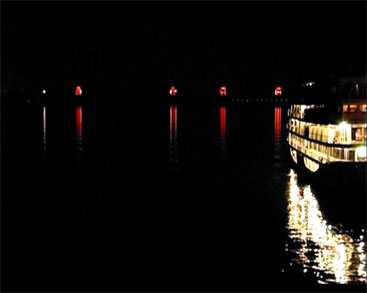
Born in 1971 in Biarritz (FR). Lives and works in Paris (FR).

2006
Film transferred on DVD
durée : 46'
Year of Purchase: 2008
The film begins as a story too beautiful, too allegorical to be true. Lake Vostok in the Antarctic is an immense pocket of water that has been trapped beneath a thick layer of ice for over a million years. It is the most pristine place in the world, and its ancient ecosystem may contain alternative life forms. But we may never know for sure. Scientists, although tempted by exploration, refrain from it because penetrating the lake would mean contaminating it and disturbing its presumed equilibrium. The conflict between knowledge and preservation is irresolvable: the lake continues to generate fantasy and speculation. It is consequently “purer” than one could ever imagine.
Over blurry images of a luminous point floating in the dark, a voice enumerates the raw data, without any unnecessary commentary. The matter-of-fact and sober tone of voice underscores the unreal character of the message. However, everything that it says is accurate: Sub is a poetical documentary, at once precise and improbable, formally simple and intellectually complex, about a real scientific paradox. The very form of the film imitates the rhythm of its subject, where the abstract image echoes the narrated situation whose fantastic, vertiginous aspect emerges as the eye begins to adapt to and tame the darkness. Using a specific situation, the film deals with the concept of an ideal, inaccessible alterity that is not otherworldly but lies beneath our feet. Infra- rather than extra-terrestrial. The immediacy of the unknown. The images, which turn out to be nocturnal tracking shots of a river, are dark, nearly monochrome, glacial and anesthetized, and reconstruct an autistic, “anti-sensory” experience of a potential explorer of Lake Vostok—a cryobot developed by NASA which could bore its way through the ice, resealing the passage behind it. A deaf and blind machine.
Do the images come from the Yangtze River in China? It makes no difference: there is no distinguishable image. Nothing to show. Nothing to feel. There is only distance. Projection. Absolute otherness. The film touches on the notion of the ineffable, on an aporetic experience that is both conceivable and impossible. When observation annihilates observation. Self-cannibalizing knowledge. A reality that vanishes as one penetrates it, as in the famous scene from Fellini’s Roma where the construction of a subway exposes sumptuous frescoes of a Roman villa to immediate degradation. Again, phantasm, vertigo. Hermetism rouses curiosity and causes frustration by fueling the imagination. This principle of “void if discovered” has its place in scientific and philosophical, as well as poetic and artistic configurations. Marcel Duchamp’s “figuration d’un possible” comes to mind, or Kierkegaard’s “What wine is so sparkling, what so fragrant, what so intoxicating, as possibility?”, or yet Freud’s frustration as the driving force of desire, etc. This is also the temptation of an impossible experience and radical transcendence that we find in aporetic investigations of such thinkers as Jacques Derrida, Maurice Blanchot, Emmanuel Lévinas, and François Laruelle writing on the night, the neuter, the outside as attempts to describe the ineffable. Lake Vostoc, a sublime absence, ideal and inaccessible, impenetrable and fascinating, can be seen as a metaphor for art. Farewell. Sweet dreams.
Guillaume Désanges